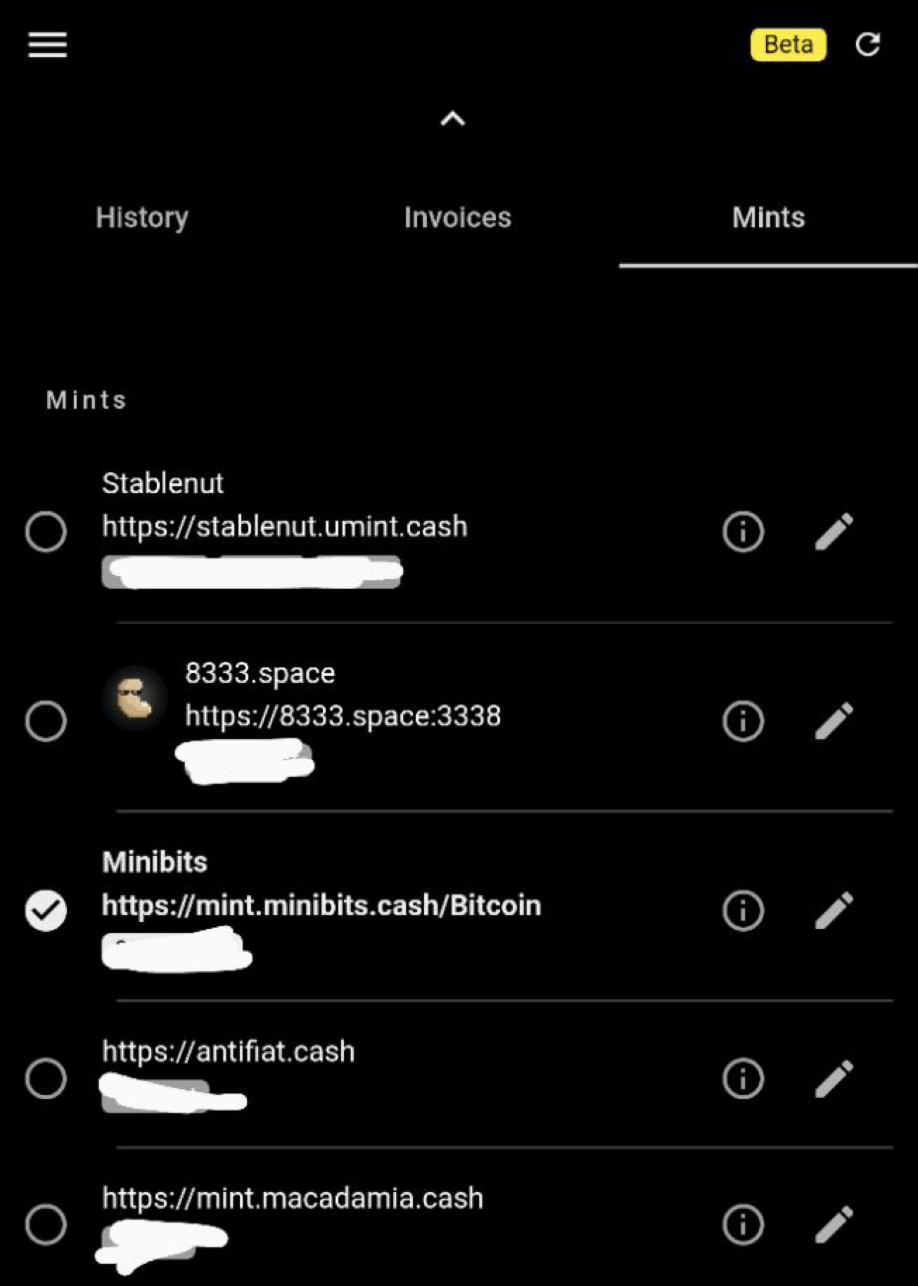calle 👁️⚡👁️
posted
4 days ago
Tiny update: cashu.me now shows the mint icon if the mint operator defines one
For nutshell: MINT_INFO_ICON_URL="https-://your-url/icon-256x256.png"


utxo the webmaster 🧑💻
posted
4 days ago
Best seller in Canada, recommended by doctors! 

bitcoin.rocks
posted
4 days ago
Will do this week!
brugeman
posted
4 days ago
Please explain it to us too! Can't wait for your monster post.
David
posted
4 days ago
And it’s what normies look like to us.
calle 👁️⚡👁️
posted
4 days ago
Release: nutshell 0.16.3 – minor bug fixes and small additions 🫡
Highlights:
- Multinut payments turned on by default for CLN and LND
- Mints can now signal multiple URLs in case their DNS gets rugged
> pip install cashu -U
https://image.nostr.build/e5c228fff12c2f8e349fb8bc66a079a25b1dbdbf13c2035a4a996af143429eca.jpg
Release with full change log on GitHub
https://github.com/cashubtc/nutshell/releases/tag/0.16.3
Vic
reposted
4 days ago
{"id":"31c543dbb41170cfd25f2236fee0cb1d46b11fb35ea27b54568cbb116a56da1a","pubkey":"5d5484c84967aac3986cd512af8dcdd52433d0901adbbb59236011884283aa1e","created_at":1731594651,"kind":1,"tags":[["p","5f69082cc20dbdd25b320eb0c3e79f3bf6a1c92e60623449cf3224b0fa11eda9","","mention"],["p","d987084c48390a290f5d2a34603ae64f55137d9b4affced8c0eae030eb222a25","","mention"],["p","1bbd0a5e2477ef7af680e5e51927bc86f3475317e63f5ee83c55402c6b18a8a2","","mention"],["r","https://x.com/jamesob/status/1857049961235403101"]],"content":"THE CONSENSUS CONUNDRUM\n\nBitcoin faces a one-of-a-kind leadership problem \n\n\nBy nostr:nprofile1qqs976gg9npqm0wjtveqavxru70nha4peyhxqc35f88nyf9slgg7m2gpr9mhxue69uhhyetvv9ujuumwdae8gtnnda3kjctv9u4s2sqj\n\n—\n\nA lot of consensus-change proposals for bitcoin are on the table at the moment. All of them have good motivations, whether it's scaling UTXO ownership or making self-custody more tractable. I won’t rehash them here, you’re probably already familiar. Some have been actively developed for years.\n\nThe past two such changes that have been made to bitcoin successfully, Segwit and Taproot, were massive engine-lift-style deployments fraught with drama. There have been smaller changes in bitcoin’s past, like the introduction of locktimes, but for some reason the last two have been kitchen sink affairs.\n\nThe reality not often talked about by many bitcoin engineers is that up until Taproot, bitcoin’s consensus development was more or less operating under a benevolent dictatorship model. Project leadership went from Satoshi to Gavin to… well, I’ll stop naming names.\n\nCore developers will likely quibble with this characterization, but we all know deep down that to a first order approximation that it’s basically true. The “final say” and big ideas were implicitly signed off on by one guy, or maybe a small oligarchy of wizened autists.\n\nIn many ways there’s really nothing wrong with this - most (all?) major opensource projects operate similarly with pretty clear leadership structures. Oftentimes they have benevolent dictators who just “make the call” in times of high-dimensional ambiguity. Everyone knows Guido and Linus and the based Christian sqlite guy.\n\nBitcoin is aesthetically loathe to this but the reality, whether we like it or not, is that this is how it worked up until about 2021.\n\nGiven that, there are three factors that create the CONSENSUS CONUNDRUM facing bitcoin right now:\n\n(1) The old benevolent dictators (or high-caste oligarchy) have abdicated their power, leaving a vacuum that shifts the project from “conventional mode of operation” to “novel, never-before-tried” mode: an attempt at some kind of supposedly meritocratic leaderlessness.\n\nThis change is coupled with the fact that\n\n(2) the possible design space for improvements and things to care about in bitcoin is wide open at this point. Do you want vaults? Or more L2s? What about rollups? Or how about a generic computational tool like CAT? Or should we bundle the generic things with applications (CTV + VAULT) to make sure they really work?\n\nThe problem is that all of these are valid opinions. They all have merit, both in terms of what to focus on and how to get to the end goal. There really isn’t a clear “correct” design pattern.\n\n(3) A final factor that makes this situation poisonous is that faithfully pursuing, fleshing out, building, “doing the work” of presenting a proposal IS REALLY REALLY TIME CONSUMPTIVE AND MIND MELTING.\n\nGetting the demos, specs, implementation, and \"marketing\" material together is a long grind that takes years of experience with Core to even approach.\n\nI was well paid to do this fulltime for years, and the process left me with disgusted with the dysfunction and having very little desire to continue contribution. I think this is a common feeling.\n\nA related myth is that businesses will do something analogous to aid the process. The idea that businesses will build on prospective forks is pretty laughable. Most bitcoin companies have a ton on their backlog, are fighting for survival, and have basically no one dedicated to R&D. The have a hard enough time integrating features that actually make it in.\n\nMany of the ones who do have the budget for R&D are shitcoin factories that don’t care about bitcoin-specific upgrades.\n\nI’ve worked for some of the rare companies that care about bitcoin and do have the money for this kind of R&D, and even then the resources are not sufficient to build a serious product demo on top of 1 of N speculative softforks that may never happen.\n\n---\n\nThis kind of situation is why human systems evolve leadership hierarchies. In general, to progress in a situation like this someone needs to be in a position to say “alright, after due consideration we’re doing X.” \n\nOf course what makes this seem intractable is that the Bitcoin mythology dictates (rightly) that clear leadership hierarchies are how you wind up, in the limit, with the Fed.\n\nSure, bitcoin can just never change again in any meaningful way (\"ossify\"). But at this point that almost certainly resigns it to yet another financial product that can only be accessed with the benefit of a large institution.\n\nIf you grant that bitcoin should probably keep tightening its rules for more and better functionality, but that we should go \"slow and steady,\" I think there are issues with that too.\n\nBecause another factor that isn’t talked about is that as bitcoin rises in price, and as nation-states start buying in size, the rules will be harder to change. So inaction — not deciding — is actually a very consequential decision.\n\nI do not know how this resolves.\n\n—\n\nThere’s another uncomfortable subject I want to touch on: where the power actually lies.\n\nThe current mechanism for changing bitcoin hinges on what Core developers will merge. This of course isn’t official policy, but it’s the unintended reality. \n\nOther less technically savvy actors (like miners and exchanges) have to pick some indicator to pay attention to that tells them what changes are safe and when they are coming. They have little ability or interest to size these things up for themselves, or do the development necessary to figure them out.\n\nMy Core colleagues will bristle at this characterization. They’ll say “we’re just janitors! we just merge what has consensus!” And they’re not being disingenuous in saying that. But they’re also not acknowledging that historically, that is how consensus changes have operated. \n\nThis is something that everyone knows semi-consciously but doesn’t really want to own.\n\nCore devs saying “yes” and clicking merge has been a necessary precursor every time. And right now none of the Core devs are paying attention to the soft fork conversations - sort of understandable, there’s a bunch to do in bitcoin.\n\nBut let’s be honest here, a lot of the work happening in Core has been sort of secondary to bitcoin’s realization. \n\nMempool work is interesting, but the whole model is more or less upside down anyway because it’s based on altruism. For-profit darkpools and accelerators seem inevitable to me, although that could be argued. Much of the mempool work is rooted in support for Lightning, which is pretty obviously not going to solve the scaling problem.\n\nSure, encrypted P2P connections are great, but what’s even the point if we can’t get on-chain ownership to a level beyond essentially requiring the use of an exchange, ecash mint, sidechain, or some other trusted third party?\n\nMy main complaint is that Core has developed an ivory tower mindset that more or less sneers at people piatching long-run consensus stuff instead of trying to actually engage with the hard problems.\n\nAnd that could have bitcoin fall short of its potential.\n\n—\n\nI don’t know what the solution to any of this is. I do know that self-custody is totally nervewracking and basically out of the question for casual users, and I do know that bitcoin in its current form will not scale to twice-monthly volume for even 10% of the US, let alone most of the world.\n\nThe people who don’t acknowledge this, and who want to spend critical time and energy wallowing in the mire of proposing the perfect remix of CTV, are making a fateful choice.\n\nMost of the longstanding, fully specified fork proposals active today are totally fine, and conceptually they’d be great additions to bitcoin.\n\nHell, probably a higher block size is safe given features like compactblocks and assumeutxo and eventually utreexo. But that’s another post for another day.\n\n---\n\nI've gone back and forth about writing a post like this, because I don't have any concrete prescriptions or recommendations. I guess I can only hope that bringing up these uncomfortable observations is some distant precursor to making progress on scaling self-custody.\n\nAll of these opinions have probably been expressed by @JeremyRubin years ago in his blog. I’m just tired of biting my tongue.\n\nThanks to nostr:nprofile1qqsdnpcgf3yrjz3fpawj5drq8tny74gn0kd54l7wmrqw4cpsav3z5fgpz4mhxue69uhk2er9dchxummnw3ezumrpdejqz9rhwden5te0wfjkccte9ejxzmt4wvhxjmcprpmhxue69uhhyetvv9ujuumwdae8gtnnda3kjctvl3x2lg and nostr:nprofile1qqsph0g2tcj80mm676qwtegey77gdu682vt7v067aq792spvdvv23gspzamhxue69uhhyetvv9ujumn0wd68ytnzv9hxgtc5a5hjp for feedback on drafts of this.\n\n\nhttps://x.com/jamesob/status/1857049961235403101","sig":"43391d5daf1ce0ca7a8bc3b4a4d660c77b5577a8253f8eeb5199e6b21503e15986604178632256f3b4b269bb4a3094d099cb10184e8e15c458cad4b9dbd6454f"}
Angor
posted
4 days ago
Open-source meaning you can check progress and codes yourself...
🤝👇
https://github.com/block-core/angor
#nostr #bitcoin #angor
35cdc79a:a4025f01
posted
4 days ago
Marktbericht: Siemens und Telekom schieben den DAX an
Unter der Führung der beiden DAX-Schwergewichte Siemens und Telekom legt der DAX kräftig zu. Der Index lässt dabei die wichtige Unterstützungsmarke von 19.000 Punkten hinter sich.
➡️ https://www.tagesschau.de/wirtschaft/finanzen/marktberichte/marktbericht-dax-boerse-aktien-gold-oel-bitcoin-trump-telekom-100.html?at_medium=mastodon&at_campaign=tagesschau.de
#Marktbericht #DAX #Börse #Bitcoin #Trump #Gold #Öl #Aktien #Telekom
Gigi
reposted
4 days ago
{"id":"0000d734ece18a14763c3d7207f6697c8dc13eef48f257ac4f06b00fd5c41f73","pubkey":"0aa39e5aef99a000a7bdb0b499158c92bc4aa20fb65931a52d055b5eb6dff738","created_at":1731596400,"kind":1,"tags":[["nonce","120280","16"]],"content":"joinmarket still doesn't work with descriptor wallets in bitcoin core, and it's become kind of pressing that this is addressed\n\nlegacy wallets have been deprecated for a long time, and are very likely going to be removed in next major version of bitcoin core (29.0), there's migration functionality to upgrade old wallets but this won't help for the use of legacy RPC calls like \"importmulti\"\n\nafter that it will ofc. still be possible to use it with version 28.x, but it's kind of sad to see an important privacy tool fall behind like this\n\nso in case anyone wants to give it a go:\nhttps://github.com/JoinMarket-Org/joinmarket-clientserver/issues/1571","sig":"4608cfc7bd9604837c51ab6552cd5162509bfb53d4c1262deba73b81a168eb6dfd8adbaf1437b9bda22173fbce98d46edc98e2f99ae4432145b1544dc94225d9"}
.
posted
4 days ago
Gotta buy vintage clothes. New clothes are trash.
97424562:20af21b7
posted
4 days ago
Secure your #Bitcoin? A passphrase is your safety net! Thanks to BIP39, add an extra layer of security. Curious? Let's dive deeper! #BIP39 #Security . .
97424562:20af21b7
posted
4 days ago
Secure your #Bitcoin? A passphrase is your safety net! Thanks to BIP39, add an extra layer of security. Curious? Let's dive deeper! #BIP39 #Security . .
0f389bba:9b3f148f
posted
4 days ago
🌊 SURF 'N TURF 🏝️
-THE ISLAND LIFE-
 There will be signs....
Credits Goes to the respective
Author ✍️/ Photographer📸
🐇 🕳️
#Bitcoin #Satoshis #Freedom #Apocalypse #Music #Movies #Philosophy #Literature
There will be signs....
Credits Goes to the respective
Author ✍️/ Photographer📸
🐇 🕳️
#Bitcoin #Satoshis #Freedom #Apocalypse #Music #Movies #Philosophy #Literature
 There will be signs....
Credits Goes to the respective
Author ✍️/ Photographer📸
🐇 🕳️
#Bitcoin #Satoshis #Freedom #Apocalypse #Music #Movies #Philosophy #Literature
There will be signs....
Credits Goes to the respective
Author ✍️/ Photographer📸
🐇 🕳️
#Bitcoin #Satoshis #Freedom #Apocalypse #Music #Movies #Philosophy #Literature
utxo the webmaster 🧑💻
posted
4 days ago
That they don't want to go to jail?
Derek Ross
posted
4 days ago
PV Dan 🤙🏻💜🫂
Nav
posted
4 days ago
Normalize leaving people in whatever reality they have chosen.
Haters gonna hate.
Winners gonna win.
Stay focused.
#bitcoin #nostr
#grownostr
0f389bba:9b3f148f
posted
4 days ago
🌊 SURF 'N TURF 🏝️
-THE ISLAND LIFE-
 The Abundance Habit by Amanda Terry Hamm, which offers practical strategies for fostering an abundance mindset through a structured approach:
1. Focus on Different Forms of Abundance: This book expands the concept of abundance beyond financial wealth, helping readers find "more than enough" in multiple areas, including health, joy, creativity, and relationships. It emphasizes a holistic view, showing that abundance can improve every facet of life, not just wealth.
2. Four-Step System: Hamm introduces a four-step framework—“Say It, See It, Write It, Do It”—aimed at creating a mindset shift. This process is designed to change negative thinking patterns into positive ones, making it easier to focus on goals and aspirations.
3. Daily Exercises: The book contains 120 exercises that readers can use to practice abundance daily. These exercises are highly actionable, with prompts and examples that encourage continuous engagement and self-reflection. This routine reinforces the habit-building process and makes concepts easier to internalize.
4. Journaling and Affirmations: Hamm incorporates journaling and affirmations as key practices, which help readers articulate their goals and embed positive beliefs into their daily routines. The exercises help readers track their progress and maintain focus on their personal journey.
5. Limiting Beliefs: A key component is identifying and challenging limiting beliefs that may hinder a person’s potential. Hamm guides readers in recognizing these mental barriers, offering strategies to reframe and replace them with empowering beliefs.
6. Visualization Techniques: The “See It” phase uses visualization exercises that encourage readers to picture their ideal outcomes, which can enhance motivation and clarity. This focus on visualization aligns with principles of psychology that show how envisioning success can help drive actions toward achieving it.
7. Comprehensive Approach to Goal Achievement: The book combines positive thinking with practical steps for achieving specific goals. Rather than merely encouraging optimism, it provides readers with tools to take concrete steps towards realizing their dreams and achieving personal growth.
8. Self-Discovery: By exploring areas like self-worth and joy, Hamm's framework encourages a deeper understanding of what abundance means for each individual, allowing readers to define and pursue their personal version of a fulfilling life.
The Abundance Habit is a thoughtful, actionable guide for readers seeking to cultivate a mindset that recognizes and attracts positive outcomes. It provides an accessible and structured approach to shifting one’s mindset from scarcity to abundance and is well-suited for those looking to actively reframe their perspectives on success and fulfillment.
Credits Goes to the respective
Author ✍️/ Photographer📸
🐇 🕳️
#Bitcoin #Satoshis #Freedom #Apocalypse #Music #Movies #Philosophy #Literature
The Abundance Habit by Amanda Terry Hamm, which offers practical strategies for fostering an abundance mindset through a structured approach:
1. Focus on Different Forms of Abundance: This book expands the concept of abundance beyond financial wealth, helping readers find "more than enough" in multiple areas, including health, joy, creativity, and relationships. It emphasizes a holistic view, showing that abundance can improve every facet of life, not just wealth.
2. Four-Step System: Hamm introduces a four-step framework—“Say It, See It, Write It, Do It”—aimed at creating a mindset shift. This process is designed to change negative thinking patterns into positive ones, making it easier to focus on goals and aspirations.
3. Daily Exercises: The book contains 120 exercises that readers can use to practice abundance daily. These exercises are highly actionable, with prompts and examples that encourage continuous engagement and self-reflection. This routine reinforces the habit-building process and makes concepts easier to internalize.
4. Journaling and Affirmations: Hamm incorporates journaling and affirmations as key practices, which help readers articulate their goals and embed positive beliefs into their daily routines. The exercises help readers track their progress and maintain focus on their personal journey.
5. Limiting Beliefs: A key component is identifying and challenging limiting beliefs that may hinder a person’s potential. Hamm guides readers in recognizing these mental barriers, offering strategies to reframe and replace them with empowering beliefs.
6. Visualization Techniques: The “See It” phase uses visualization exercises that encourage readers to picture their ideal outcomes, which can enhance motivation and clarity. This focus on visualization aligns with principles of psychology that show how envisioning success can help drive actions toward achieving it.
7. Comprehensive Approach to Goal Achievement: The book combines positive thinking with practical steps for achieving specific goals. Rather than merely encouraging optimism, it provides readers with tools to take concrete steps towards realizing their dreams and achieving personal growth.
8. Self-Discovery: By exploring areas like self-worth and joy, Hamm's framework encourages a deeper understanding of what abundance means for each individual, allowing readers to define and pursue their personal version of a fulfilling life.
The Abundance Habit is a thoughtful, actionable guide for readers seeking to cultivate a mindset that recognizes and attracts positive outcomes. It provides an accessible and structured approach to shifting one’s mindset from scarcity to abundance and is well-suited for those looking to actively reframe their perspectives on success and fulfillment.
Credits Goes to the respective
Author ✍️/ Photographer📸
🐇 🕳️
#Bitcoin #Satoshis #Freedom #Apocalypse #Music #Movies #Philosophy #Literature
 The Abundance Habit by Amanda Terry Hamm, which offers practical strategies for fostering an abundance mindset through a structured approach:
1. Focus on Different Forms of Abundance: This book expands the concept of abundance beyond financial wealth, helping readers find "more than enough" in multiple areas, including health, joy, creativity, and relationships. It emphasizes a holistic view, showing that abundance can improve every facet of life, not just wealth.
2. Four-Step System: Hamm introduces a four-step framework—“Say It, See It, Write It, Do It”—aimed at creating a mindset shift. This process is designed to change negative thinking patterns into positive ones, making it easier to focus on goals and aspirations.
3. Daily Exercises: The book contains 120 exercises that readers can use to practice abundance daily. These exercises are highly actionable, with prompts and examples that encourage continuous engagement and self-reflection. This routine reinforces the habit-building process and makes concepts easier to internalize.
4. Journaling and Affirmations: Hamm incorporates journaling and affirmations as key practices, which help readers articulate their goals and embed positive beliefs into their daily routines. The exercises help readers track their progress and maintain focus on their personal journey.
5. Limiting Beliefs: A key component is identifying and challenging limiting beliefs that may hinder a person’s potential. Hamm guides readers in recognizing these mental barriers, offering strategies to reframe and replace them with empowering beliefs.
6. Visualization Techniques: The “See It” phase uses visualization exercises that encourage readers to picture their ideal outcomes, which can enhance motivation and clarity. This focus on visualization aligns with principles of psychology that show how envisioning success can help drive actions toward achieving it.
7. Comprehensive Approach to Goal Achievement: The book combines positive thinking with practical steps for achieving specific goals. Rather than merely encouraging optimism, it provides readers with tools to take concrete steps towards realizing their dreams and achieving personal growth.
8. Self-Discovery: By exploring areas like self-worth and joy, Hamm's framework encourages a deeper understanding of what abundance means for each individual, allowing readers to define and pursue their personal version of a fulfilling life.
The Abundance Habit is a thoughtful, actionable guide for readers seeking to cultivate a mindset that recognizes and attracts positive outcomes. It provides an accessible and structured approach to shifting one’s mindset from scarcity to abundance and is well-suited for those looking to actively reframe their perspectives on success and fulfillment.
Credits Goes to the respective
Author ✍️/ Photographer📸
🐇 🕳️
#Bitcoin #Satoshis #Freedom #Apocalypse #Music #Movies #Philosophy #Literature
The Abundance Habit by Amanda Terry Hamm, which offers practical strategies for fostering an abundance mindset through a structured approach:
1. Focus on Different Forms of Abundance: This book expands the concept of abundance beyond financial wealth, helping readers find "more than enough" in multiple areas, including health, joy, creativity, and relationships. It emphasizes a holistic view, showing that abundance can improve every facet of life, not just wealth.
2. Four-Step System: Hamm introduces a four-step framework—“Say It, See It, Write It, Do It”—aimed at creating a mindset shift. This process is designed to change negative thinking patterns into positive ones, making it easier to focus on goals and aspirations.
3. Daily Exercises: The book contains 120 exercises that readers can use to practice abundance daily. These exercises are highly actionable, with prompts and examples that encourage continuous engagement and self-reflection. This routine reinforces the habit-building process and makes concepts easier to internalize.
4. Journaling and Affirmations: Hamm incorporates journaling and affirmations as key practices, which help readers articulate their goals and embed positive beliefs into their daily routines. The exercises help readers track their progress and maintain focus on their personal journey.
5. Limiting Beliefs: A key component is identifying and challenging limiting beliefs that may hinder a person’s potential. Hamm guides readers in recognizing these mental barriers, offering strategies to reframe and replace them with empowering beliefs.
6. Visualization Techniques: The “See It” phase uses visualization exercises that encourage readers to picture their ideal outcomes, which can enhance motivation and clarity. This focus on visualization aligns with principles of psychology that show how envisioning success can help drive actions toward achieving it.
7. Comprehensive Approach to Goal Achievement: The book combines positive thinking with practical steps for achieving specific goals. Rather than merely encouraging optimism, it provides readers with tools to take concrete steps towards realizing their dreams and achieving personal growth.
8. Self-Discovery: By exploring areas like self-worth and joy, Hamm's framework encourages a deeper understanding of what abundance means for each individual, allowing readers to define and pursue their personal version of a fulfilling life.
The Abundance Habit is a thoughtful, actionable guide for readers seeking to cultivate a mindset that recognizes and attracts positive outcomes. It provides an accessible and structured approach to shifting one’s mindset from scarcity to abundance and is well-suited for those looking to actively reframe their perspectives on success and fulfillment.
Credits Goes to the respective
Author ✍️/ Photographer📸
🐇 🕳️
#Bitcoin #Satoshis #Freedom #Apocalypse #Music #Movies #Philosophy #Literature
Semisol
posted
4 days ago
looks like an open source project got fucked over by a particular overpriced hardware company
AK 👸🏻
posted
4 days ago
I LOVE that. Ii'd take that over a GT3 RS any day. Those wheels. 😍
Vic
posted
4 days ago
Sometimes shes perky. Sometimes she goes down.
hodlcuban
posted
4 days ago
GM!
hodlcuban
posted
4 days ago
GM to you too
273d77da:92f85aca
reposted
4 days ago
{"id":"0000d734ece18a14763c3d7207f6697c8dc13eef48f257ac4f06b00fd5c41f73","sig":"4608cfc7bd9604837c51ab6552cd5162509bfb53d4c1262deba73b81a168eb6dfd8adbaf1437b9bda22173fbce98d46edc98e2f99ae4432145b1544dc94225d9","kind":1,"tags":[["nonce","120280","16"]],"pubkey":"0aa39e5aef99a000a7bdb0b499158c92bc4aa20fb65931a52d055b5eb6dff738","content":"joinmarket still doesn't work with descriptor wallets in bitcoin core, and it's become kind of pressing that this is addressed\n\nlegacy wallets have been deprecated for a long time, and are very likely going to be removed in next major version of bitcoin core (29.0), there's migration functionality to upgrade old wallets but this won't help for the use of legacy RPC calls like \"importmulti\"\n\nafter that it will ofc. still be possible to use it with version 28.x, but it's kind of sad to see an important privacy tool fall behind like this\n\nso in case anyone wants to give it a go:\nhttps://github.com/JoinMarket-Org/joinmarket-clientserver/issues/1571","created_at":1731596400}
Vic
posted
4 days ago
Achievement Unlocked.
You'll be awarded a badge for this one Im sure!
nostr:nevent1qqsqzm2egq8xl5qd7de3u9qzrzlux7hdjjq8azghjgljqj7qmxrl3ngpz4mhxue69uhhyetvv9ujuerpd46hxtnfduhsygrwwhmewguhegeftc85eg8mcm4ee3umapd6lh2kh5mcygx23mh8fcpsgqqqqqqsd4u6pf